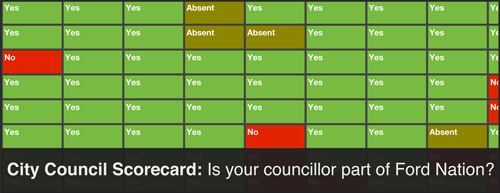February 23, 2012: Google Docs (Best View) - Download (PDF)  - Download (PNG)
Council has actually met three separate times in February, but only one of those meetings resulted in a vote worth recording on the City Council Scorecard. Aside from a couple of integrity commissioner issues that — while fun to watch — didn’t go anywhere, February’s regular council meeting was fairly quiet. If arguments in the chamber got contentious, it was probably because momentum was building behind-the-scenes for the special council meeting held on February 8 that saw the mayor’s transit vision smashed with a procedural hammer.
From that special February 8 meeting, the vote added to this month’s scorecard represents the most significant defeat of Rob Ford’s administration. I’ve made that claim several times before — and each time it was true! — but this is a serious major-league defeat for Rob Ford. The council he’s supposed to be leading basically told him that he wasn’t allowed to make decisions on transit.
The New Vote
The vote added:
- CC17.1, Motion 3a as moved by TTC Chair Karen Stintz, pushed council to endorse what they had already endorsed in 2009 (and several other times): light rail on Finch West & Eglinton. The second part of her motion, which also passed, will see an expert panel report back to council with options for Sheppard. While no one wanted to say it, this is the vote that brings back Transit City. It passed — after two re-votes because councillors kept hitting the wrong button — by a final and decisive margin of 25-18.
Trend Watch
What’s most notable about the chart is how bad 2012 has been for Rob Ford. Only 20 of 44 councillors have sided with the mayor more than 50% of the time on major items this year. And the gap is only widening: going by the same metrics I was using last year, only three councillors — Gloria Lindsay Luby, James Pasternak and Jaye Robinson — fit the profile of the “mushy middle” based on their 2012 votes, and they were all reliable Ford supporters through the first nine months of this term. Everyone else has either supported the mayor on virtually every item or come out in strong opposition.
Ford has lost most of the sway he had over votes through 2011. Opposition councillors are now able to round up 23 votes without too much hassle. That threshold has been crossed. And there’s no going back unless the mayor starts compromising.
The thing to watch going forward is whether we’ll find a scenario where 30 votes will go against Ford. A consistent bloc of 30 councillors — controlling two-thirds of the chamber  — would effectively neuter any positional power Ford has as mayor. It’d be a whole different ballgame.
The path to 30 isn’t easy. Take the 25 votes who went against Ford on the transit item, then add Gloria Lindsay Luby, who was absent from the vote, to make 26. From there, the best bets would be councillors like Peter Milczyn — who bravely opposed the mayor on the Gary Webster firing –, Gary Crawford, Michael Thompson, and basically anyone else with a Liberal Party membership or a stated interest in the arts, the environment or sensible urban planning.
It’s not straightforward, but it’s doable. And every uncompromising and bullheaded decision made by the mayor’s office only makes it more doable.
Questions
Questions about the Council Scorecard? Read my notes on methodology. Also, you can email me.
Tags: city council scorecard, karen stintz, transit, ttc

